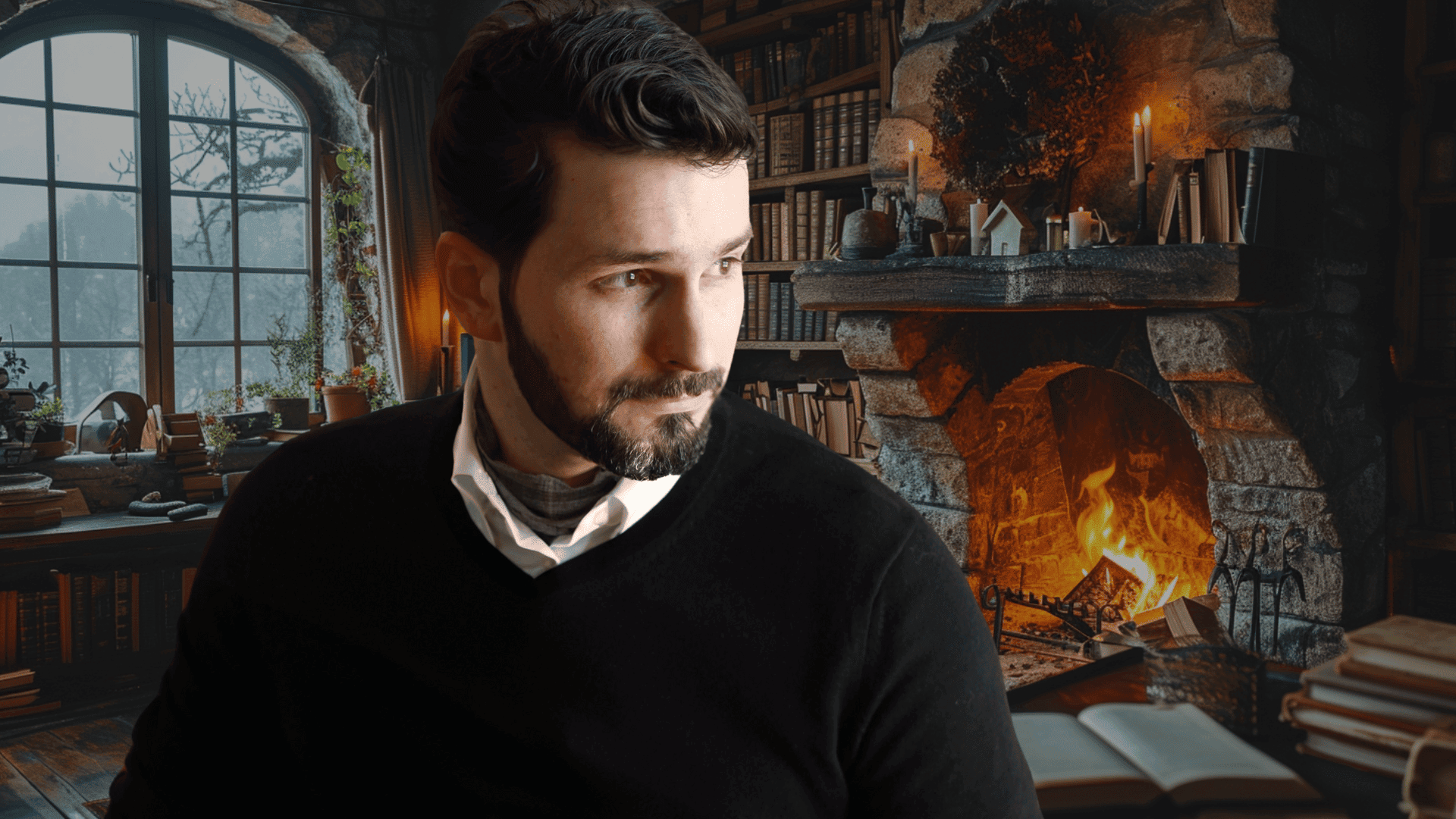During the Renaissance, Dante crafted an imaginative, myth-like vision to plumb the depths and approach the heights of the Christian world-view.
In a single epic story, he brought together so many themes and threads that he defined the popular imagination of Hell, Purgatory and Heaven for centuries, even if most misunderstood him.
Like a ‘Pilgrim’s Progress’, it is layered with meaning. Like a chef, he’s cooking with excellent ingredients. Like a Faust or Jacob, he’s grappling with the inner narrative of humanity skimming the line between chaos and creativity.
Before he contributed his myth to the popular imagination, our common resources that colored the Magisterium were local myths and scattered musings of mystics.
Myth is more than lies breathed through silver. Its more than pre-scientific accounts of the natural world. It’s more than the accounts of the gods of the Gentiles.
Myths are the transpersonal, universal, archetypal efforts to make sense of our humanity.
Myths break down into fairy tales, fables, cautionary tales, pre-scientific accounts, ritual ideas, tribal origins, and others. But the greatest myths are often the oldest, and the ones retold the most.
As Jordan Petersen discusses in his work with ‘Maps of Meaning’, that’s what they are. They are incredibly sophisticated maps of the meaning in our psyches.
The Renaissance restored to the western mind an enriching hoard of elder ideas, thousands of years of psychological and spiritual wrestling.
Ideas we had grown comfortable with, and jigsawed together in a cultural mosaic, were suddenly deepened and broadened through contact with different wisdom.
The mosaic no longer fit as neatly. A new, more mature narrative was needed to put the pieces together. The usual reaction is to reject or replace.
It takes calm wisdom to resolve, to test and hold fast to the good.
In ‘The Flame Imperishable,’ we can see that Tolkien re-synthesized Thomas Aquinas’ analysis into a narrative, a narrative that emboldens and excites Genesis. The near global appreciation of ‘Lord of the Rings’ and the revivifying of fantasy as a genre is a testament to this.
Plenty of us authors believe that being a Catholic author means we have to write from a sanitized, pious worldview, one where the characters seem to smile from the winner’s stand, and wisely promote hope. Everything ends happily.
Often, these heroes are noble and altruistic, their relationships perfect and ideal, their formation and environment an envied fantasy.
Because isn’t that how life should be?
Not necessarily.
“When Dante dedicated the Paradiso to Can Grande della Scala, he said that the literal meaning of the Divine Comedy is the way in which human beings by their own free acts earn eternal punishment or reward. That is the vision of human action that makes fiction Catholic. It is not a matter of having priests and nuns on the set, not a matter of explicit reference to Catholic things, but rather the Dantesque vision. There are priests and nuns in stories that lack this vision; this vision is present where there is nothing peculiarly Catholic in view.” Ralph McInerny, ‘On Being a Catholic Writer’
Every human butts up against the universal realities of sin, misery, and death.
We have to learn to see and fight for a world built from hope and holiness and beauty. But it doesn’t come easily. We are all born with a random hand, and must deal with the hand we’re dealt.
Plenty of things go wrong. Broken people tend to bad choices. We’re all ever only two steps from hell, or a handshake from Heaven. Morality runs through the heart of every individual.
For a while, Catholics became known for a certain kind of fiction.
More often than not, the stories were fairy-tale like in their simplicity, aiming to inspire young readers like saints stories. And yet, saints’ stories had been carefully pruned of any lurid details of personal failure.
Perhaps it was a well-meant idea, presenting the best of the best. But either then and now, there remains a deep disconnect between the real life experiences of the reader, and the surreal happiness of the characters.
Daily life is almost as dark as old fairy tales. And the unwashed lives of the saints are just as riveting and raw as our own today. We need those mature stories too.
Pious, didactic tales have a certain value – but as a teaching tools, not as entertainment. Certainly not after childhood.
Catholic authors today feel that they have to write more of this fiction, replete with religious figures, carefully ordered families and idealistic characters.
Perhaps this inspiration for literature comes from a need to giftwrap the Great Commission. We are using our fiction to explicitly share a message. To ‘evangelize.’
That’s not to say you can’t. And that’s not to say that it isn’t enjoyed quite widely and fiercely among certain people.
But that’s not evangelizing. That’s proselytizing. That’s pushing a pre-digested dialogue on someone who isn’t ready for it.
But that’s only a small part of the story.
And that’s not what a Catholic author is limited to.
God is not in competition with his creation. All of creation, from the cosmic teeter between chaos and consciousness, to contact with the strange, to communion with the friend, is all part of the ‘5th Gospel,’ the ongoing message God shares with us from the beginning, the gospel on which everything else depends. Creation itself.
“The great mistake that the unthinking Catholic reader usually makes is to suppose that the Catholic writer is writing for him. Occasionally this may happen, but generally it is not happening today. Catholics brought up in sheltered Catholic communities with little or no intellectual contact with the modern world are apt to suppose that truth as Catholics know it is the order of the day except among the naturally perverse.” Flannery O’Connor, ‘Catholic Novelists and Their Readers’
Your average reader today won’t pick up ‘Percy Wynn’, or watch ‘The Bells of St Marys’. You’ve perhaps not even heard of these.
The average reader is watching Netflix’s trending lineup.
And here is the difference that I want to drive a wedge into.
How we write is inspired by who we are and where we come from.
The general ‘Christian’ ethic lays a great stress on the words said. This is like a liturgy.
The deeper Christ-ethic lays a greater stress on belief as a living out of our inner life. The deeds done matter as much as intention. The acting out of the divine liturgy in daily life.
Our actions are how we live out our belief. Sometimes, our words don’t match our actions. We may have beautiful thoughts. We may have terrible actions.
Just like characters in our stories.
It all comes back to the prime responsibility of the author.
Be a good author first and foremost. Tell a good story.
If you can’t do that, you won’t hold attention to convey the message you intend.
If you can captivate… you can spellbind. Look at Tolkien, Lewis, Rowling, Martin, and their impact on a century of readers.
They’ve added to the world hoard of themes and tools to explore the layers of the Inferno and Paradiso.
Maybe you’ll do the same. Or not.
Either way, our role is just as daunting and daring and deep.
Today, with the human family being drawn together into constant and interpenetrating contact, we stand on the frontier of a new Renaissance.
It will spark the same usual rejection and replacement tendencies in people.
But we happy few who can celebrate the good, the noble, the admirable, the lovely, and the true… think on these things.
Wherever we find them.
“Fantasy is a natural human activity. It certainly does not destroy or even insult Reason; and it does not either blunt the appetite for, nor obscure the perception of, scientific verity.” On Fairy Stories, J. R. R. Tolkien



This section of the course gave me some good food for thought. One of my favorite lines was, “We have to learn to see and fight for a world built from hope and holiness and beauty. But it doesn’t come easily.”
Also, “Daily life is almost as dark as old fairy tales.” Yes, it really can be! Which is why I find it pretty easy to write darker fantasy stories these days. They seem to spring naturally from my own life experiences.
Thanks for chiming in, Mary Rose :) Glad this resonated with you!